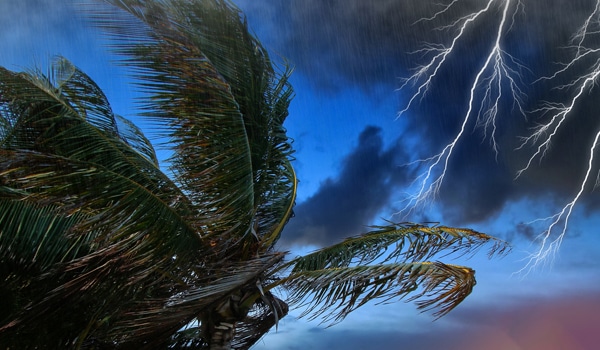 Those of us who live in Central Florida have been lucky so far in avoiding major storms this year. However, we still have three months left in Hurricane Season 2021, and if the National Oceanic and Atmospheric Administration is correct, we can expect to see a lot of storm activity.
Those of us who live in Central Florida have been lucky so far in avoiding major storms this year. However, we still have three months left in Hurricane Season 2021, and if the National Oceanic and Atmospheric Administration is correct, we can expect to see a lot of storm activity.
Weather experts typically recommend that we make sure we are prepared for damaging storms, but if the past can tell us anything about the future, it’s that our best preparations are never enough to prevent devastation from a hurricane. A quick look at the catastrophic damage Hurricane Ida has left in her wake reveals some hard truths about preparing for hurricanes.
Hurricane Ida
Hurricane Ida made landfall on the Gulf Coast of Louisiana on August 29, 2021, as a Category 4 storm with 150 mph winds. Very early in the morning, the National Hurricane Center had warned of “life-threatening storm surge, potentially catastrophic wind damage, and flooding rainfall.” Four hours later, they alarmingly reported that Ida had “continued to strengthen” and was now an “extremely dangerous category 4 hurricane” with maximum sustained winds of 145 mph. As the storm made landfall, winds reached 150 mph and more than 16 inches of rain drenched parts of Louisiana. The flood-protection system, built after Hurricane Katrina devastated New Orleans sixteen years ago, protected the city from catastrophic flooding, but throughout Louisiana, Ida blew roofs off homes, tore trees from their roots, knocked down power lines, flooded streets and left debris scattered everywhere. In the storm’s immediate aftermath, millions of lives have been disrupted. Over a million Louisiana residents are without power; many are without water; and others who evacuated the area have been told to not come home. Except for the fact that New Orleans’ flood-protection system worked, there is no silver lining here. What there is, however, are hard truths we can learn from the storm. Covid-19 Complicates the Danger of Storms The spread of Covid-19 and the health problems and deaths it has caused have plagued us for almost a year and a half. We should be used to it by now, but case rates, hospitalizations and deaths are on the rise again, so getting accustomed to the virus is difficult. When a natural disaster, such as a powerful hurricane, threatens us at the same time, the situation can be dire.
With most hospitals at capacity, evacuating patients to different facilities before the storm was not possible, and discharging patients was also not an option, since the Covid-19 patients require oxygen. Now, many hospitals are relying on generators and those that were damaged or have generator failures must find places for their patients.
Residents who evacuated the area also pose a threat in potentially spreading Covid-19 as they seek food and shelter outside their own homes and possibly out of state. Currently, they are sheltering in northwest Louisiana, Texas, Arkansas and Alabama, among other locations, and they cannot go home.
Hurricanes and Tropical Storms Can Be Unpredictable
Sometimes we prepare for the worst, thinking strong winds and damaging rainfall could cause extensive damage in our area, but are pleasantly surprised when the storm weakens or misses us altogether. Other times, tropical depressions become tropical storms which intensify quickly to hurricane levels, causing havoc as they make landfall.
Hurricane Ida was one of the bad surprises that intensified quickly, leaving people unprepared for the extremely high winds. In addition, storm surges caused flash flooding, even in areas not affected by the high winds, and in New Orleans, where the flood protection system prevented massive flooding, runoff from heavy rain still flooded some streets.
The Problems Don’t End with the Storm
Now that the hurricane is over, the storm’s collateral damage is expanding. As New York Times reporters put it, “avoiding the worst of a disaster does not mean avoiding disaster.” People in New Orleans are sweltering in the heat. Many are getting low on food and water and have no way to cook anything. Schools are closed and hospitals fear losing power from generators. The convention center may have to be used to care for people with special medical needs. Meanwhile, in areas of Louisiana where damage was extensive, hundreds of thousands of residents who are without water and transportation are being transported to shelters in other parts of the state.
After people’s immediate needs are met, the hard work of cleaning up, assessing the damage and making repairs must begin. As survivors of other hurricanes will tell you, this is a long, arduous process. Sometimes, it can take more than a year for debris to be cleared, property to be repaired or replaced and insurance claims to be settled. Florida residents devastated three years ago by Hurricane Michael can tell you about the pain and frustration of waiting to get what they needed to begin recovering from the storm.
We can only hope the people in Louisiana do not have to wait so long for the help they need.
Being Prepared for Hurricanes in Central Florida
While the heart-breaking problems in Louisiana suggest that preparations for hurricanes are not sufficient, damages and losses could have been much more devastating had New Orleans and people throughout the state been less prepared. For those of us in the Orlando area, the message may be: take the power of tropical storms and hurricanes seriously; protect your family and property as much as possible and seek help after experiencing storm damage.
Malik Law specializes in handling Florida hurricane damage insurance claim disputes.
